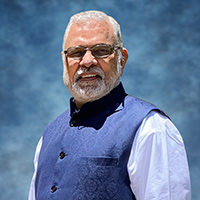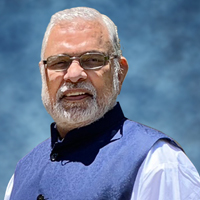Editorial July 2025
Dear Readers,
In two of the world’s largest democracies—India and the United States—voters are witnessing a strikingly similar trend: once-dominant political parties, the Indian National Congress and the Democratic Party, are floundering, not due to a lack of resources or reach, but because of a vacuum in leadership, vision, and unity. The parallels between these two parties are not only fascinating but also deeply concerning—especially for those who care about the health of democratic debate and governance.
The Congress Party in India, once the proud torchbearer of India’s independence movement, now seems like a shadow of its former self. Formed and nurtured under the leadership of Mahatma Gandhi, the Congress Party played a pivotal role in uniting the country and securing freedom from evil British colonial rule.
However, in recent decades, that legacy has steadily eroded. In election after election, the party continues to lose ground—both in parliamentary seats and in public credibility. From holding a commanding majority in the Lok Sabha to now struggling to remain the principal opposition, the Congress Party’s trajectory has been one of steady decline.
What’s most troubling is not just the electoral defeats but the complete lack of leadership and direction. Rahul Gandhi, often regarded as the de facto leader, has repeatedly failed to inspire confidence among the public or even within his own party. Many regional Congress leaders either operate independently or have completely left the party. The party has no fresh ideas, no visionary roadmap, and certainly no charismatic leader capable of rallying the masses. But what the Congress Party does have—loud and clear—is a singular obsession: opposing Prime Minister Narendra Modi.
Whether Modi’s policies benefit millions—such as the rollout of digital infrastructure, the enhancement of defense capabilities, the expansion of welfare schemes, or ambitious infrastructure projects—is irrelevant. The Congress Party will oppose any proposal from Prime Minister Modi. There is no policy debate, no constructive counter-proposals—just blind resistance. The party has made this “anti-Modi” stance its sole message, a strategy so flimsy that voters can easily see through it.
The party swiftly silences even occasional voices of moderation. When senior Congress leader Shashi Tharoor publicly praised Prime Minister Modi’s diplomatic efforts and global standing, he was sharply criticized by members within his party. Similarly, when AIMIM leader Owaisi acknowledged certain developmental initiatives under Modi’s government, he too was met with backlash—from opposition ranks that refuse to allow even a single positive word about the Prime Minister. These incidents underscore the toxic political culture that views acknowledging good governance as betrayal.
When a party is defined not by its vision but by its opposition, it loses relevance. And that is exactly what’s happening to the Congress Party.
Let’s now shift our focus to the Democratic Party in the United States. In certain aspects, the Democrats are faced with a similar dilemma. Despite having controlled the White House and the Senate recently, the Democratic Party is now fragmented, leaderless, and increasingly defined not by its policy initiatives, but by its obsessive focus on one man—Donald J. Trump.The primary uniting factor for the Democrats in the U.S. is their opposition to Trump.
Rather than building a united, forward-thinking platform to address inflation, border security, rising crime, energy independence, or global instability, the Democratic Party appears to be operating with one primary objective: STOP Trump. Every legislative conversation, media campaign, or public speech somehow circles back to him.
Even Democrats themselves are now publicly acknowledging this dysfunction. Recently, Senator Slotkin from Michigan delivered a scathing assessment of her party, comparing it to a solar system “with no sun.” “We’re like a solar system with no sun … We don’t act as a team, and when we don’t work as a team, we turn our guns on each other, and it’s so, so, so, fruitless,” she said in a speech at the Center for American Progress. Similarly, the U.S. Rep. Moulton made a bold statement: “I’m concerned right now that we haven’t embraced the fact that we need to change, that we need to do things differently if we’re going to win, and therefore it’s not a sure thing that we’re going to win back the House in 2026,” he said.
These quotes should make headlines across every major news outlet because it reflects a fundamental truth.
The Democratic Party is not functioning cohesively. It is fragmented between moderates, progressives, and even socialists like Zohran Mamdani and AOC, lacking a clear focal point. No democratic leader has emerged as a unifying force. Instead, internal conflicts, woke extremism, and identity politics have created an incoherent agenda that repels more voters than it inspires. And like their Indian counterparts, U.S. Democrats have one unifying mantra: “Anything but Trump.” They would rather see a policy fail than give Trump credit. Such an attitude is not a governing philosophy—it’s a reactionary mindset.
Both the Congress Party and the Democratic Party have embraced a politics of negation. Instead of articulating bold visions for the future, they define themselves in opposition to strong, charismatic leaders—Modi in India and Trump in the U.S. And while these leaders may have their vision different from their opposition, the failure of the opposition to offer compelling alternatives only strengthens their popularity.
It’s not that criticism of the ruling government is unwarranted—democracy depends on accountability and debate. But criticism without coherence or constructive policy alternatives is just noise. Worse, it erodes public trust in opposition parties and undermines the health of democratic institutions.
In India, voters are rejecting Congress because they don’t see how it can lead the nation forward. In the U.S., the Democrats risk the same fate if they continue to rely on anti-Trump sentiment without offering fresh solutions for a country grappling with economic uncertainty, geopolitical tension, and cultural polarization.
Leadership is not about pandering to media cycles or vilifying opponents. It’s about uniting people around a shared purpose and offering realistic, transformative solutions to national problems. Narendra Modi, with the overall approval rating of 77%, the highest in the world, whether one agrees with all his policies or not, has clearly offered a roadmap for India’s development and global resurgence. His leadership has elevated India’s voice on the world stage—from the G20 presidency to initiatives like “Digital India” and “Make in India.”
Trump, too, despite his controversies, tapped into deep-seated frustrations about globalization, job losses, and political elitism. He energized millions of Americans who felt forgotten by the establishment. Whether or not one supports his return, he offers his party clarity, direction, and energy—traits sorely missing in the current Democratic playbook.
In contrast, both the Congress Party in India and the Democratic Party in the U.S. have failed to elevate inspiring figures, articulate coherent platforms, or rally the nation with visionary ideas. Their biggest talking points are their opponents. That’s not leadership—it’s desperation.
As a long-time observer of Indian-American affairs, U.S.-India relations, and global democratic trends, I believe democracy thrives when both the government and the opposition are strong, responsible, and visionary. India needs an opposition party that does more than scream “Modi bad.” The United States needs a Democratic Party that does more than chant “Stop Trump.” Both countries require political parties guided by conviction, not convenience—by unity, not division.
 As voters and citizens, we deserve better. We deserve ideas, solutions, and leaders who inspire—not political gamesmanship driven by hate and hollow slogans. Unless the Congress Party and the Democratic Party acknowledge this, they will continue to exist as adrift, leaderless, and increasingly irrelevant entities.
As voters and citizens, we deserve better. We deserve ideas, solutions, and leaders who inspire—not political gamesmanship driven by hate and hollow slogans. Unless the Congress Party and the Democratic Party acknowledge this, they will continue to exist as adrift, leaderless, and increasingly irrelevant entities.
Raj Shah
Managing Editor

















